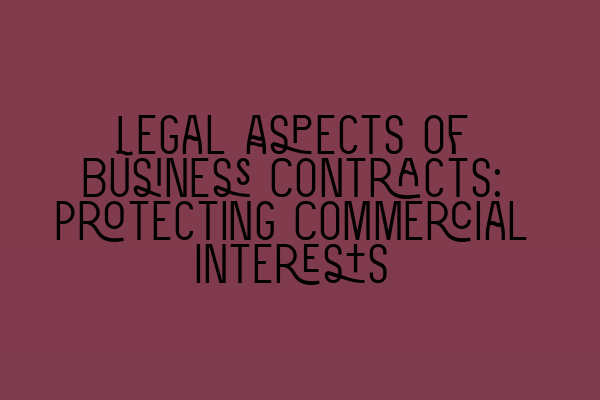Legal Aspects of Business Contracts: Protecting Commercial Interests
Welcome to SQE Contract Law! As a leading solicitor firm, we understand the importance of protecting commercial interests through well-drafted business contracts. In today’s fast-paced and highly competitive business world, having watertight contractual arrangements is crucial for both small businesses and large corporations.
In this blog post, we will delve into the legal aspects of business contracts and provide valuable insights on how to effectively protect your commercial interests. So, let’s dive right in!
The Significance of Business Contracts
When it comes to conducting business, contracts serve as the foundation for a wide range of transactions. Whether it’s a partnership agreement, a purchase order, or a service contract, having a clear and comprehensive contract is essential for defining the expectations, rights, and obligations of all parties involved.
By establishing a contractual agreement, businesses can:
- Specify the scope of work and deliverables
- Outline payment terms and pricing
- Allocate risks and liabilities
- Protect intellectual property rights
- Set dispute resolution mechanisms
Now that we understand the importance of business contracts, let’s explore the key legal considerations to keep in mind when drafting and negotiating these agreements.
Legal Considerations for Drafting Business Contracts
1. Clear and Precise Language
When drafting a business contract, it’s crucial to use clear and precise language that leaves no room for ambiguity. Ambiguous terms or clauses can lead to misunderstandings and disputes in the future. Therefore, it’s essential to define all terms and conditions in a manner that is easily understandable to all parties involved.
Moreover, using concise language not only ensures clarity but also helps to enforce the intended meaning of the contract when there are potential disagreements or breaches.
2. Identify Parties Correctly
Properly identifying the parties involved in the contract is an important aspect of contract drafting. Make sure to include the legal names and addresses of the entities entering into the agreement. Incorrect identification of parties can lead to complications, especially during the enforcement of the contract.
In instances where the contracting party is an individual, it’s essential to include their full legal name and any relevant titles or positions. For businesses, include the company name, registration number, and address for accurate identification.
3. Define Scope of Work and Deliverables
The scope of work and deliverables should be clearly defined in business contracts to avoid any misunderstandings or disagreements. Clearly outline the tasks, responsibilities, and expectations that both parties have agreed upon. This ensures that the deliverables and quality meet the agreed-upon standards.
Additionally, include a timeframe for the completion of the work to create a sense of urgency and avoid potential delays.
4. Payment Terms and Pricing
Money matters are an integral part of business contracts. Define the payment terms and pricing structure, including details on the currency, payment schedule, and any applicable late payment charges or penalties.
It’s important to ensure that the payment terms are fair and reasonable for both parties, taking into account factors such as the complexity of the work, market conditions, and industry standards.
5. Intellectual Property Protection
Intellectual property (IP) rights are valuable assets for businesses. In your contract, clearly state who owns and has the right to use any intellectual property created during the course of the contract.
Include clauses regarding the protection of trade secrets, trademarks, copyrights, and patents. This helps safeguard your commercial interests and prevents unauthorized use or exploitation of your intellectual property.
6. Dispute Resolution Mechanisms
Despite the best efforts, disputes can arise in any contractual relationship. Therefore, it’s essential to include provisions for dispute resolution in your business contracts.
Specify the preferred method of dispute resolution, such as negotiation, mediation, or arbitration. This allows parties to resolve disputes amicably and expeditiously, minimizing costs and preserving business relationships.
Conclusion
Business contracts are essential tools for protecting commercial interests. By paying attention to important legal considerations and drafting comprehensive agreements, businesses can minimize the risks associated with contractual relationships.
At SQE Contract Law, we specialize in providing expert advice and assistance for all contract-related matters. If you need further guidance or assistance in protecting your commercial interests through effective contract drafting and negotiation, don’t hesitate to contact our team.
Related Articles:
